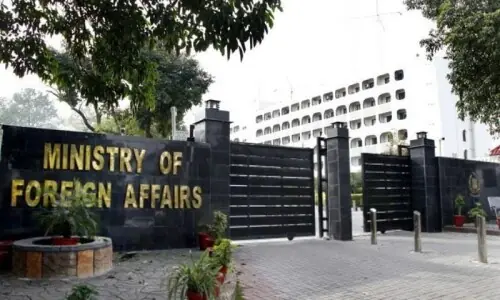NEW DELHI: India's election commission has lifted a ban on a top aide of Hindu nationalist opposition leader Narendra Modi that had threatened to hobble his efforts to win votes in the country's most populous state.
Amit Shah, Modi's campaign manager in the battleground state of Uttar Pradesh, was banned from election rallies and meetings this month after making speeches deemed to have stirred tensions with minority Muslims.
The Bharatiya Janata Party (BJP), which has named Modi as its candidate to become prime minister, is forecast to emerge as the clear leader after India's five-week general election that ends on May 12.
Results are due on May 16.
A series of opinion polls this year has forecast that BJP and its allies will win the biggest chunk of the 543 parliamentary seats up for grabs but fall short of a majority.
One large poll this week predicted they would scrape a majority.
“The commission ... has decided to modify its order dated 11th April, 2014, to the effect that permission may be granted for holding any public meetings, public processions, public rallies, road shows, etc,” India's election authorities stated in an order addressed to Shah on Thursday.
Speaking earlier this month in Uttar Pradesh, Shah was recorded telling voters to reject parties with Muslim candidates. He also said Muslims in the area had raped, killed and humiliated Hindus.
The commission stated that it was lifting the ban partly because Shah had lodged an appeal in which he vowed not to use “abusive or derogatory language” and that it would monitor his campaigning using video tracking.
Uttar Pradesh is home to 134 million registered voters, more than the entire population of Japan. One in every six Indian voters lives in the state, which accounts for around a seventh of parliamentary seats.
Hindu-Muslim relations have been a tense campaign issue in the election, with critics accusing Modi, the chief minister of the western state of Gujarat, of not doing enough during religious riots there in 2002. More than 1,000 people, mostly Muslims, died in the violence.
Modi has always denied the accusations and a Supreme Court inquiry did not find enough evidence to prosecute him.
In an interview with ANI television news agency this week, Modi said he did not have personal aides and referred to Shah as a hard worker and a self-made man.
The election commission this month also banned Azam Khan, a senior member of the Samajwadi Party, a state party that governs Uttar Pradesh, for speeches that stirred “disharmony between different religious communities”.
Muslims account for about 13 per cent of India's population and are a significant vote bank in Uttar Pradesh.
































